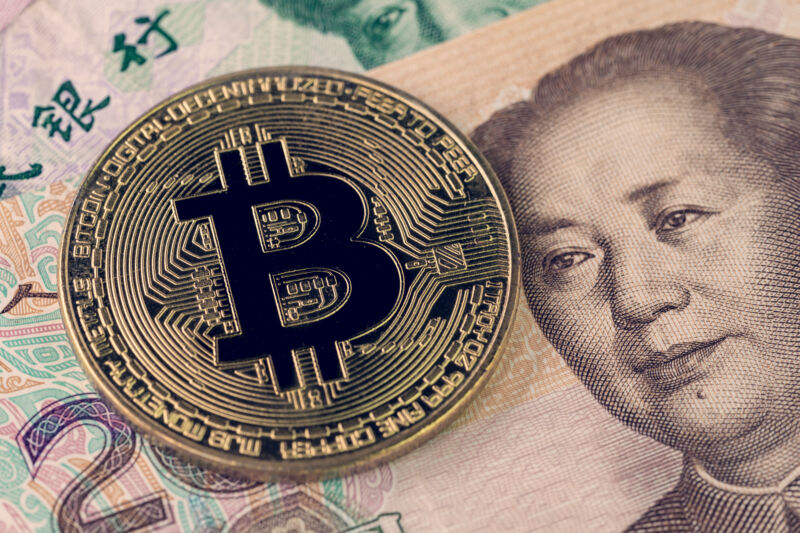China’s crackdown on cryptocurrencies intensified today, with the country’s central bank announcing that all crypto-related transactions are illegal.
“There are legal risks for individuals and organizations participating in virtual currency and trading activities,” the People’s Bank of China said in a statement jointly issued with nine other government bodies. Even Chinese nationals working overseas weren’t exempt, with the government saying that they, too, would be “investigated according to the law,” according to a report in the Financial Times.
Bitcoin and other cryptocurrencies dropped on the news. Currently, bitcoin was down 4.5 percent at the time of publication, and ethereum was down 7.5 percent.
The move follows earlier Chinese Communist Party messaging that banned cryptocurrency mining and warned financial institutions not to participate in such transactions. The crypto crackdown comes as China’s real estate developers are facing a liquidity crunch that risks infecting the rest of the economy.
Domino effect
Real estate represents almost a third of China’s gross domestic product, and developers have borrowed heavily to ride the wave. But in recent years, the Chinese Communist Party has turned on the sector after President Xi Jinping said in 2017 that “houses are for living in, not for speculation.”
Xi may not simply be motivated by ideology here—as migration to cities has slowed and birthrates have fallen, the country has become riddled with unfinished or unoccupied housing. The Rhodium Group estimates that the market’s excess could house as many as 90 million people.
Local governments have slowed land sales substantially, down 90 percent year over year. Since they rely on land sales for about a third of their revenues, the loss could have a domino effect, reducing local governments’ abilities to repay the $8.4 trillion in debt they’ve issued.
In August, Beijing attempted to further rein in the sector, demanding that developers lower the ratio of debt they hold to assets they own. Real estate companies are often highly leveraged, selling debt to build and market developments, relying on sales to pay down that debt. The nation’s second largest developer, Evergrande, has been caught flat footed by the Communist Party’s new demands. Before the decree, it was already in trouble. As property sales have slowed, Evergrande hasn’t been able to generate the cash required to finish projects. And without finishing those projects, it wasn’t generating cash to pay interest and principal on its outstanding debts. The government has prevented Evergrande from issuing new bonds to pay off its near-term debt, and the company now runs the very real risk of default.
Some observers are comparing the Evergrande crisis to Lehman Brothers, the American brokerage firm that went belly-up in 2008 at the outset of the subprime mortgage crisis. Others don’t think that the Community Party will allow an Evergrande default to create the same ripple effect, but investors are nonetheless spooked. If Evergrande’s woes do send shockwaves throughout the Chinese economy, investors may attempt to move their money elsewhere, out of China.
Capital outflows
All of that brings us to where the continued cryptocurrency crackdown comes in. The Chinese government has long restricted the flow of capital outside the country, preferring that investors keep it circulating within the nation’s economy. But cryptocurrencies are more challenging to control given their somewhat anonymous nature and the relative ease with which they can be converted into other countries’ currencies.
The crypto crackdown in China is not just because bitcoin mining had been drawing too much power, which it had been, or because it was commonly used in illicit transactions, which it was. It’s because the Chinese government likely recognizes the risks posed by an over-leveraged real estate sector, and it’s attempting to limit the fallout when the correction comes. Cryptocurrencies are simply caught in the crossfire.



3175x175(CURRENT).thumb.jpg.b05acc060982b36f5891ba728e6d953c.jpg)
Recommended Comments
There are no comments to display.
Join the conversation
You can post now and register later. If you have an account, sign in now to post with your account.
Note: Your post will require moderator approval before it will be visible.